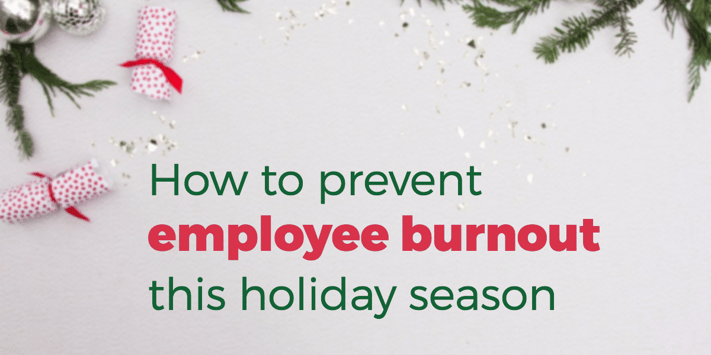
This time of year, there’s an extremely contagious little bug that gets around in crowded places, but it’s especially common in offices. It’s not the cold or flu, but something a little more insidious: employee burnout.
Burnout happens when employees have completely spent their physical, intellectual, and emotional stores, and are still pushed (by themselves, their families, their managers, or any combination of parties) to give more. It’s both easy to catch and really tough to cure.
Employee burnout can strike at any time, but it’s particularly viral during the holiday season. An increase in personal obligations, even if they’re welcome and fun, leaves the general population working at full speed, but with far less time for rest than they have at other times of year. Holiday parties, traveling to visit family, buying gifts, kids’ school performances, shorter days, crowds everywhere; taken together, these things add up to create a whole population showing up to work every morning already depleted. Throw in increased professional end-of-year requirements, and you’ve got a perfect recipe for full-on burnout.
Unfortunately, burnout is a major productivity killer, and not only for the affected employee. It can also bring down everyone who has to work closely with them. Poor morale catches like wildfire, meaning one or two burned-out people can quickly infect an entire office. So how can employers create a workplace where work is still being done without burning employees out? Better yet, how can they support staff through the busiest time of the year, so they start the new year ready to hit the ground running? Here are a few tips to try:
Reduce workload where possible
This one may sound counterintuitive, since one of the goals in preventing burnout is maintaining productivity. But the employers with the most engaged workforces are good at acknowledging and accommodating the fact that staff are people first, and employees second. Any way that you can simplify workloads or provide a shorter to-do list will be a welcome gesture for employees who already feel stretched too thin.
By taking a look at the work required of each employee and eliminating or postponing anything that’s non-essential, you can free employees up to focus on only the tasks that are of utmost importance. This requires a little strategic planning, and may mean tasks get frontloaded in the months running up to the end of the year in order to reduce expectations in November and December. However you choose to tackle it, winding down your list of requirements is a great way to let your employees take a deep breath and focus on their most pressing tasks.
Increase flexibility
The ramped-up personal expectations of the holidays aren’t often structured around a 9-to-5 schedule, and they don’t look the same for every person. Employees with far-flung family members may need to coordinate travel between multiple parties in order to see everyone, resulting in unusual visits scheduled in the weeks leading up to Christmas. People with children may want a few hours off to attend school parties or presentations. Asking people in these situations to dip into their vacation reserves right before the holidays just so they can participate in a family event comes across as overly rigid and inflexible, and is not a great way to make employees feel valued.
Providing more flexibility year-round is one of the best ways for employers to foster employee satisfaction and loyalty. Employees who are allowed to work from home, choose their own hours when practical, or take a few hours off without a formal paper trail often show higher levels of engagement and productivity as well. Even if your workplace doesn’t already provide much flexibility the rest of the year, it may be worth piloting some of these perks during the holiday season to see if they provide positive outcomes for your workforce.
Encourage rest time
The flipside of offering workplace flexibility is that it can sometimes mean the lines between personal and professional time get blurred in favor of the employer. When this imbalance happens, it undercuts efforts to prevent employee burnout. This time of year, it’s especially crucial that managers limit their after-hours communication with staff to only what is strictly necessary.
If your corporate culture generally rewards constant access (or the appearance of it), staff may be accustomed to checking their emails in the evenings. Managers should take practical steps to break this habit in themselves and their reports during the holiday season. Make sure all non-urgent phone calls and emails (regardless of what time they’re actually written) have a send time during the work day. You can hold managers and staff accountable for this in whatever way works best for your office. You may event want to consider gamifying this effort; start by assigning each intra-office team with a set number of points, and deducting a point for every email sent before or after work hours.
However you tackle it, make the message clear: your employees are humans with personal lives, and that’s a good thing. Making rest a key component of your culture means staff can show up refreshed and ready to put their best foot forward.
Provide recognition for a job well done
The end of the year is a naturally reflective time, personally and professionally, for many people. When company leaders look over staff job performance over the past year, it’s important for them to explicitly look for strong contributions by employees and shine a spotlight on them. Exhausted employees can easily lose sight of their value to the organization and feel disengaged from their work. Acknowledging great work is a great tool to motivate and re-engage people on the brink of burnout.
While these ideas require a shift in organizational culture, they’re all simple to implement if the right stakeholders see their value. Fostering engagement and satisfaction in employees is usually as simple as following The Golden Rule: treat your staff the way you’d want to be treated.
Everyone at your company wants and deserves to be treated as a full human being, during the holidays and throughout the rest of the year. Acknowledging and honoring the importance of their personal lives, and creating space for that to flourish, will ensure that your employees feel seen and valued, and will make it possible for them to show you their best work.
